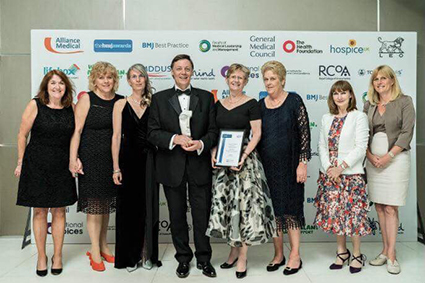BUMPES trial wins paper of the year

Professor Debra Bick (second from right) and colleagues at the BMJ Awards where they won Paper of the Year.
A research paper co-written by staff at King’s College London and Guy’s and St Thomas’ NHS Foundation Trust has won the prestigious British Medical Journal Award for UK Paper of the Year.
Debra Bick, Professor of Evidence Based Midwifery Practice at King’s, Professor Andrew Shennan, Director of Research & Development at the Trust and Annette Briley, Consultant Midwife, co-authored the paper. Guy’s and St Thomas’ was also the highest recruiting site of all the participating hospital trusts on the trial, which was led by Professor Peter Brocklehurst at the University of Birmingham.
The paper described results from the BUMPES Trial, which looked at how to improve the likelihood women who had an epidural would be able to give birth without an intervention, such as forceps or vacuum delivery. Using these interventions is only done when necessary, but they can increase the risk complications for mother and baby. Women who give birth with an intervention are also less likely to be able to give birth without them in future.
The team randomly assigned different positions to women giving birth, who had an epidural and were giving birth for the first time. The team found out that a semi recumbent position (lying on the back or side at an angle of 45 degrees) in the second stage of labour made it less likely that interventions would be needed.
Of the study, Professor Debra Bick said ‘This study clearly showed how a relatively simple intervention could make such an important difference to a woman’s birth outcomes. Our findings were probably not what people would have expected. In some ways this makes it so much more interesting as a study, as it’s good to challenge assumptions. What is more important is that for women giving birth for the first time who choose epidural analgesia, we can now discuss with them the importance that their position during the second stage of labour could make to their birth experience.’
Annette Briley said the team were thrilled to win the award, especially up against such tough competition.
‘It was such a surprise, the other papers that were nominated were really interesting, so we didn’t think we’d win. When they announced it we were so excited. This was a great example of a clinical team and a maternity research team working together closely. After we won, we went down to say thank you to all the staff on the wards, because we really couldn’t do our research without them. It’s their award as much as ours.’
The other papers nominated for the prize included the results from the STAMPEDE Trial on prostate cancer, the IMPORT LOW Trial which looked at radiotherapy for breast cancer, the REPOSE Trial which looked at using an insulin pump to treat type 1 diabetes, and the CLARITY Trial on treating proliferative diabetic retinopathy.